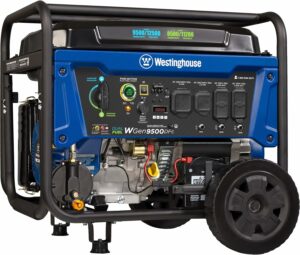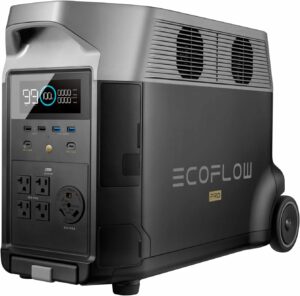Never Lose Power Again: An Overview Of How Whole-House Generators Work
Introduction
Power outages can strike at the most inconvenient times, leaving you in the dark, disrupting your daily routines, and potentially jeopardizing essential appliances and systems in your home.
In an age where we rely on electricity for almost every aspect of our lives, having a reliable backup power source is not just a luxury but a necessity. This is where whole-house generators come to the rescue.
These remarkable machines are designed to seamlessly take over when the grid fails, ensuring that your home remains powered, your family stays comfortable, and your appliances and devices continue functioning, even during the most challenging circumstances.
Provo Green Products embodies a beacon of trust in sustainable discoveries, offering choices that enhance your life and leave a positive mark on our planet.
Leveraging extensive expertise in manufacturing, construction, and various trades, we provide a solid foundation for sustainable living.
Our meticulous research process guarantees that our information about each product is precise and current, allowing you to make informed decisions.
Whether your interest lies in solar products, electric bikes, or other eco-friendly alternatives, our commitment to credibility ensures you have access to dependable insights, guiding your journey toward a more sustainable lifestyle.
Provo Green Products is your go-to destination for finding the right green products for your lifestyle.
Disclosure: As an Amazon Associate, we may earn from qualifying purchases. This does not affect the product pricing whatsoever.
Understanding Whole-House Generators
Whole-House Generators:
- Whole-house generators are a vital addition to any home, especially in areas prone to power outages. These sophisticated systems ensure your household remains powered up even when the grid fails.
- In this section, we will delve into what whole-house generators are, how they function, and why they are essential for modern homeowners.
How They Keep Your Home Powered:
- Whole-house generators are your shield against unexpected power interruptions. They operate by automatically detecting when the main power supply fails and immediately taking over to provide electricity to your home.
- This seamless transition is made possible by combining advanced technology and a reliable fuel source, which we’ll discuss in the following sections.
Different Types of Whole-House Generators:
- There is a variety of approaches to whole-house generators. Different types cater to various preferences and requirements. Here, we’ll explore the primary categories, including standby generators, backup generators, and portable generators.
- Each type has advantages and limitations, making it crucial for homeowners to choose the right one based on their needs.
- By understanding the fundamental workings of whole-house generators, homeowners can make informed decisions when purchasing and installing these systems.
- The peace of mind that comes with knowing your home will remain powered during outages is invaluable, and the following sections of this article will provide even more insights into these remarkable devices.
- By understanding the fundamental workings of whole-house generators, homeowners can make informed decisions when purchasing and installing these systems.
- The peace of mind that comes with knowing your home will remain powered during outages is invaluable, and the following sections of this article will provide even more insights into these remarkable devices.
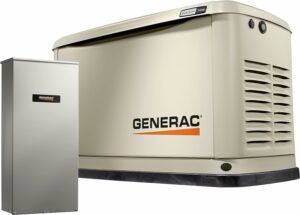
The Mechanics Behind Whole-House Generators
Internal Components and How They Function:
- Whole-house generators are intricate machines with several essential components that work together to provide your home with uninterrupted power.
- The core components include the engine, alternator, and control unit.
- The engine generates mechanical energy, the alternator converts this energy into electrical power, and the control unit manages the entire process.
Fuel Sources: Gas, Propane, or Diesel?
- Different fuel sources, including natural gas, propane, and diesel, can power whole-house generators. Each fuel source has its advantages and disadvantages, and the choice depends on factors such as availability, cost, and personal preference.
- Natural gas is often the most convenient choice as it’s supplied through pipelines, while propane and diesel provide more versatility and can be stored on-site.
Transfer Switches and Automatic Startup:
- To maintain the convenience of whole-house generators, automatic startup, and transfer switches are essential. When an outage occurs, the generator automatically starts, and the transfer switch redirects the power supply from the grid to the generator.
- This process ensures that your home experiences minimal interruption in power, and you don’t need to be present to activate the generator manually.
- Understanding the internal workings of whole-house generators is crucial for homeowners considering their installation.
- It allows them to appreciate the complexity of these machines and make informed decisions when choosing the right generator for their home.
In the following sections, we’ll explore the benefits of these generators, their installation, and maintenance to provide a comprehensive overview of this essential home technology.
Benefits of Whole-House Generators
Ensuring Continuous Power During Outages:
- The primary and most apparent benefit of whole-house generators is their ability to provide uninterrupted power during electrical outages. Whether due to severe weather, grid failures, or other unforeseen circumstances, these generators kick in automatically to keep your home powered.
- This ensures that your essential appliances and systems, such as heating and cooling, refrigeration, and medical equipment, remain functional, preventing inconvenience and potential health hazards during prolonged power loss.
Protecting Your Home’s Appliances and Systems:
- Power outages can lead to surges and fluctuations when the grid power is restored. Whole-house generators act as a buffer, stabilizing the voltage and ensuring that sudden power surges do not damage your sensitive electronics and appliances.
- This protection extends the lifespan of your valuable equipment, saving you money on repairs or replacements in the long run.
Peace of Mind for You and Your Family:
- One of the less tangible but equally valuable benefits of whole-house generators is the peace of mind they provide. Knowing that your home will remain powered, no matter the circumstances offers a sense of security and comfort.
- It eliminates the stress and inconvenience associated with outages, especially during extreme weather events, and ensures that your family’s safety and well-being are not compromised.
Environmental Considerations:
- Whole-house generators, particularly those powered by natural gas, propane, or cleaner fuels, are more environmentally friendly than traditional portable generators.
- They produce fewer emissions, which means you’re not only protecting your home but also contributing to a cleaner environment. This is especially important if you live in areas with strict emissions regulations or are concerned about your carbon footprint.
Increased Property Value:
- Installing a whole-house generator can increase the resale value of your home.
- Prospective buyers may see it as a valuable feature that sets your property apart in a competitive real estate market. It can be a selling point for those who value reliability and the convenience of a continuous power supply.
- By understanding and highlighting these benefits, homeowners can make an informed decision about investing in a whole-house generator.
- The sense of security, protection of valuable appliances, and potential increase in property value are strong incentives to consider these systems a valuable addition to any home.
In the subsequent sections, we’ll explore the installation and maintenance of whole-house generators, helping homeowners navigate the practical aspects of this investment.
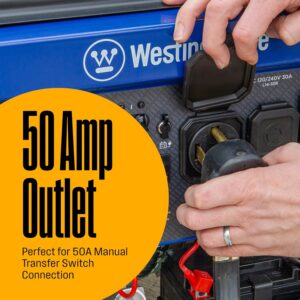
Installation and Maintenance of Whole-House Generators
Selecting the Right Generator for Your Home:
- Before installation, it’s essential to choose the right whole-house generator for your home. To let you know, factors to consider include your power needs, fuel source preference, available space for installation, and budget.
- I suggest consulting a professional generator installer or electrician to determine the most suitable generator size and type for your specific requirements.
Installation Process and Costs:
- Installing a whole-house generator is a task best left to trained professionals. They will assess your home’s electrical system, determine the optimal location for the generator, and handle all the necessary wiring and connections.
- The installation process may involve the installation of a concrete pad, fuel lines (if applicable), and an automatic transfer switch.
- Costs can vary depending on the complexity of the installation, but it’s an investment that ensures the system works as intended and complies with local building codes.
Regular Maintenance to Ensure Reliability:
- Proper maintenance is crucial to ensure that your whole-house generator remains reliable when needed. Maintenance tasks include regular inspection of the generator, fuel system checks, and changing the oil and air filters.
- It’s recommended to have a maintenance schedule in place, and many generator manufacturers provide guidelines for servicing intervals.
- You can perform these tasks yourself if you’re comfortable or hire a professional for routine maintenance.
Testing and Exercises:
- Regular testing and exercises are essential to confirm that your generator is functioning correctly. Automatic startup exercises can be programmed to run weekly, ensuring that the generator is always ready to take over during a power outage.
- Occasional manual tests during non-emergency situations help identify issues before they become critical.
Emergency Preparedness and Safety:
- It would help if you were educated about the generator’s operation and safety protocols. Ensure they know how to operate the generator safely, respond in an emergency, and what to do if they smell gas (if using a gas-powered generator).
- This knowledge will help keep everyone safe and ensure the generator operates as intended.
- By understanding the installation process and the importance of maintenance, homeowners can make informed decisions about investing in a whole-house generator.
- Regular maintenance and testing are essential to keep the system in peak condition, ensuring that it provides continuous power during outages.
In the next section, we will compare whole-house generators to portable alternatives, helping readers make the right choice for their specific power needs.
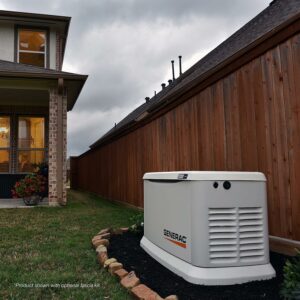
Comparing Whole-House Generators to Portable Generators
Pros and Cons of Whole-House Generators:
Pros:
- Whole-Home Power: Whole-house generators provide power to your entire home, ensuring that all appliances and systems remain functional during outages, from HVAC systems to kitchen appliances.
- Automatic Operation: These generators are designed for automatic startup, so you don’t need to be present to activate them when the power goes out. They seamlessly take over, ensuring a smooth transition.
- Low Maintenance: While they require maintenance, whole-house generators typically require less hands-on involvement than portable generators.
Cons:
- Higher Initial Cost: Whole-house generators are a significant investment, both in terms of the generator itself and the professional installation, making them a more substantial upfront expense.
- Fuel Dependency: These generators usually require a dedicated fuel source, such as natural gas or propane, which may not be available in all locations.
- Installation Complexity: The installation process involves professionals and can be more complex, requiring space for the generator and compliance with local building codes.
Pros and Cons of Portable Generators:
Pros:
- Affordability: Portable generators are generally more affordable than whole-house generators, making them an attractive option for those on a budget.
- Versatility: Portability allows you to use these generators in various locations, making them suitable for camping, outdoor events, and other off-grid activities.
- Fuel Options: Portable generators can run on gasoline, propane, or diesel, providing flexibility in fuel choice.
Cons:
- Limited Power: Portable generators are typically less powerful and may not be sufficient to power your entire home, necessitating a choice of which appliances to run during an outage.
- Manual Operation: You need to manually start and connect a portable generator during an outage, which can be inconvenient and less reliable.
- Maintenance: Portable generators require regular maintenance, and you must ensure they are in good working condition when needed.
Making the Right Choice for Your Power Needs:
- Choosing between a whole-house generator and a portable generator largely depends on your power needs, budget, and preferences.
- Whole-house generators offer the convenience of whole-home power, automatic operation, and reliability. However, they come at a higher initial cost and may require a dedicated fuel source.
- On the other hand, portable generators are a more budget-friendly option. Still, they require manual operation, have limited power capacity, and are best suited for providing power to specific appliances or outdoor use.
The decision between these two types of generators is a crucial one.
By understanding the pros and cons of each, homeowners can make an informed choice that aligns with their requirements and budget, ensuring that they have a reliable backup power source in times of need.
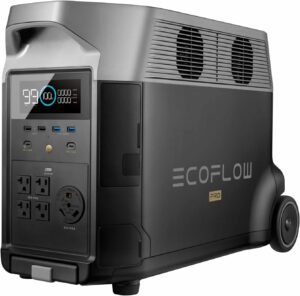
Conclusion
Whole-house generators are a reliable and comprehensive solution for homeowners seeking to ensure uninterrupted power during outages.
With their automatic operation, capacity to power your entire home, and the peace of mind they offer, they are a valuable investment.
However, it’s essential to consider factors like initial cost, fuel availability, and installation complexity when deciding if they are the right choice for your needs.
On the other hand, portable generators provide a more budget-friendly option but come with limitations in terms of power capacity and convenience.
The choice ultimately depends on your unique circumstances and preferences.
Whichever option you select, having a backup power source is a prudent step towards safeguarding your home and family from the inconveniences of unexpected power interruptions.
Remember, Provo Green Products is your trusted source for discovering sustainable and eco-friendly solutions for your lifestyle. Stay in touch for more valuable insights.
Stay in Touch!
I’am a dedicated entrepreneur with many years of experience and an integrity-driven individual who is highly motivated to succeed. Leveraging extensive expertise in manufacturing, construction, and various trades, we can provide a solid foundation for sustainable living. Our meticulous research process guarantees that our information about each product is precise and current, allowing you to make informed decisions. A deep understanding of business operations empowers me to consistently implement improvements that result in ongoing success. Visit site.

